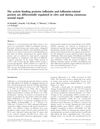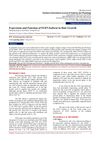14 citations,
December 2018 in “The American journal of pathology” Activating Nrf2 in skin cells speeds up wound healing by increasing the growth of certain stem cells.
8 citations,
January 2016 in “Cells tissues organs” Norepinephrine helps skin cells grow, which is important for hair growth.
 7 citations,
February 2023 in “Inflammation and Regeneration”
7 citations,
February 2023 in “Inflammation and Regeneration” The protein interleukin-1 alpha helps regenerate hair follicles and increase stem cell growth in mice.
 204 citations,
October 1999 in “EMBO journal”
204 citations,
October 1999 in “EMBO journal” Overexpression of activin A in mice skin causes skin thickening, fibrosis, and improved wound healing.
 106 citations,
July 2013 in “Advances in wound care”
106 citations,
July 2013 in “Advances in wound care” UV radiation can help sterilize wounds and promote healing but requires careful use to avoid damaging cells.
 21 citations,
May 2018 in “Journal of Cosmetic Dermatology”
21 citations,
May 2018 in “Journal of Cosmetic Dermatology” Costunolide helps human hair cells grow and can stimulate hair growth in mice.
30 citations,
June 1993 in “The Journal of Cell Biology” The oncoprotein causes abnormal hair growth without increasing skin cancer risk.
 32 citations,
December 2018 in “Cytokine”
32 citations,
December 2018 in “Cytokine” Type I interferons play a key role in the development of various skin diseases.
 46 citations,
December 2001 in “Journal of Endocrinology/Journal of endocrinology”
46 citations,
December 2001 in “Journal of Endocrinology/Journal of endocrinology” FLRG and follistatin have different roles in wound healing.
43 citations,
December 2006 in “The American journal of pathology” Edar signaling is crucial for controlling hair growth and regression.
 11 citations,
January 2001 in “Cambridge University Press eBooks”
11 citations,
January 2001 in “Cambridge University Press eBooks” Androgens can cause hair growth in some areas but hair loss on the scalp.
 2 citations,
December 2023 in “Royal Society of Chemistry eBooks”
2 citations,
December 2023 in “Royal Society of Chemistry eBooks” Hair is a complex organ, and understanding its detailed structure and growth phases is crucial for analyzing substances within it.
 3 citations,
July 2011 in “Folia Histochemica et Cytobiologica”
3 citations,
July 2011 in “Folia Histochemica et Cytobiologica” Calcium reduces involucrin in rat hair bulbs but doesn't affect filaggrin and Kdap.
 190 citations,
October 2002 in “The FASEB journal”
190 citations,
October 2002 in “The FASEB journal” Androgens may cause hair loss by increasing TGF-beta1 from scalp cells, which inhibits hair cell growth.
 October 2023 in “International journal of biology, pharmacy and allied sciences”
October 2023 in “International journal of biology, pharmacy and allied sciences” Henna helps wounds heal faster and better.
 39 citations,
August 2018 in “Scientific reports”
39 citations,
August 2018 in “Scientific reports” Claudin-1 is important for the barrier function and growth of hair.
 8 citations,
February 2013 in “Central European Journal of Biology”
8 citations,
February 2013 in “Central European Journal of Biology” Melanocytes are diverse cells important for pigmentation and skin health, influenced by genetics and environment.
 1 citations,
January 2018 in “Recent clinical techniques, results, and research in wounds”
1 citations,
January 2018 in “Recent clinical techniques, results, and research in wounds” Using developmental signaling pathways could improve adult wound healing by mimicking scarless embryonic healing.
 8 citations,
January 2016 in “European Journal of Plastic Surgery”
8 citations,
January 2016 in “European Journal of Plastic Surgery” PRGF treatment is safer and more effective for hair loss than topical minoxidil.
 3 citations,
April 2021 in “Journal of Cosmetic Dermatology”
3 citations,
April 2021 in “Journal of Cosmetic Dermatology” Combination therapy with QR 678 Neo and 5% Minoxidil is most effective for male hair loss.
 222 citations,
August 2009 in “Experimental Dermatology”
222 citations,
August 2009 in “Experimental Dermatology” Stem cells are crucial for wound healing and understanding their role could lead to new treatments, but more research is needed to answer unresolved questions.
 3 citations,
September 2022 in “Archives of dermatological research”
3 citations,
September 2022 in “Archives of dermatological research” The fractional carbon dioxide laser is a safe and effective treatment for alopecia areata and works better than betamethasone valerate cream alone.
 160 citations,
January 2014 in “Seminars in cell & developmental biology”
160 citations,
January 2014 in “Seminars in cell & developmental biology” Early development of hair, teeth, and glands involves specific signaling pathways and cellular interactions.
 47 citations,
February 2021 in “Pharmacological research”
47 citations,
February 2021 in “Pharmacological research” Exosomes can improve skin health and offer new treatments for skin repair and rejuvenation.
 3 citations,
December 2022 in “bioRxiv (Cold Spring Harbor Laboratory)”
3 citations,
December 2022 in “bioRxiv (Cold Spring Harbor Laboratory)” The research reveals how early embryonic mouse skin develops from simple to complex structures, identifying various cell types and their roles in this process.
 11 citations,
January 2012 in “Journal of cell science”
11 citations,
January 2012 in “Journal of cell science” Rac1 is essential for proper hair structure and color.
 1 citations,
February 2021 in “Scholars international journal of anatomy and physiology”
1 citations,
February 2021 in “Scholars international journal of anatomy and physiology” Different forms of FGF5 either promote or inhibit hair growth.
 26 citations,
September 2018 in “Colloids and Surfaces B: Biointerfaces”
26 citations,
September 2018 in “Colloids and Surfaces B: Biointerfaces” A new liposome treatment helps heal deep burns on mice by improving hair regrowth and reducing scarring.
 165 citations,
January 2008 in “Journal of biomaterials science. Polymer ed.”
165 citations,
January 2008 in “Journal of biomaterials science. Polymer ed.” The peptide GHK-Cu helps heal and remodel tissue, improves skin and hair health, and has potential for treating age-related inflammatory diseases.
 108 citations,
September 2002 in “The Journal of clinical investigation/The journal of clinical investigation”
108 citations,
September 2002 in “The Journal of clinical investigation/The journal of clinical investigation” Lowering testosterone speeds up wound healing in male mice.

























